Scientists may finally understand how the rabies virus can drastically change its host’s behavior to help spread the disease, which kills about 59,000 people annually.

Image/CDC
A new study published in the journal Scientific Reports shows how a small piece of the rabies virus can bind to and inhibit certain receptors in the brain that play a crucial role in regulating the behavior of mammals. This interferes with communication in the brain and induces frenzied behaviors that favor the transmission of the virus.
Dr. Karsten Hueffer, lead author and a professor of veterinary microbiology at the University of Alaska Fairbanks, said he hopes the findings will help scientists better understand and treat the infectious viral disease.
“Many infectious agents change behavior in their host, but we do not understand how they do this,” he said. “Our study provides, for the first time, a detailed molecular mechanism for how an infectious agent induces specific behaviors.”
Hueffer said that although vaccinations for rabies were first developed in the mid-19th century, scientists have struggled to explain how the virus can induce aggressive behavior in animals like dogs, which contribute up to 99 percent of all rabies transmissions to humans, according to World Health Organization estimates.
“The rabies virus only has five genes and very little information,” he said. “Dogs have more than 20,000 genes with sophisticated immune and central nervous systems. Yet this virus can reprogram a dog’s behavior so it loses fear, becomes aggressive and bites, which allows the virus to spread through the dog’s saliva.”
Oct 31 to Nov. 7, get 13% off sitewide at EntirelyPetsPharmacy.com, with code MONSTER16
Hueffer said these behavioral changes are well known and cemented into the American narrative. In the novel “Old Yeller,” Travis must put down his beloved dog after it is bitten and infected by a rabid wolf. In “To Kill a Mockingbird,” Atticus Finch is called to shoot a rabid dog.
Read more at University of Alaska Fairbanks
Related:

